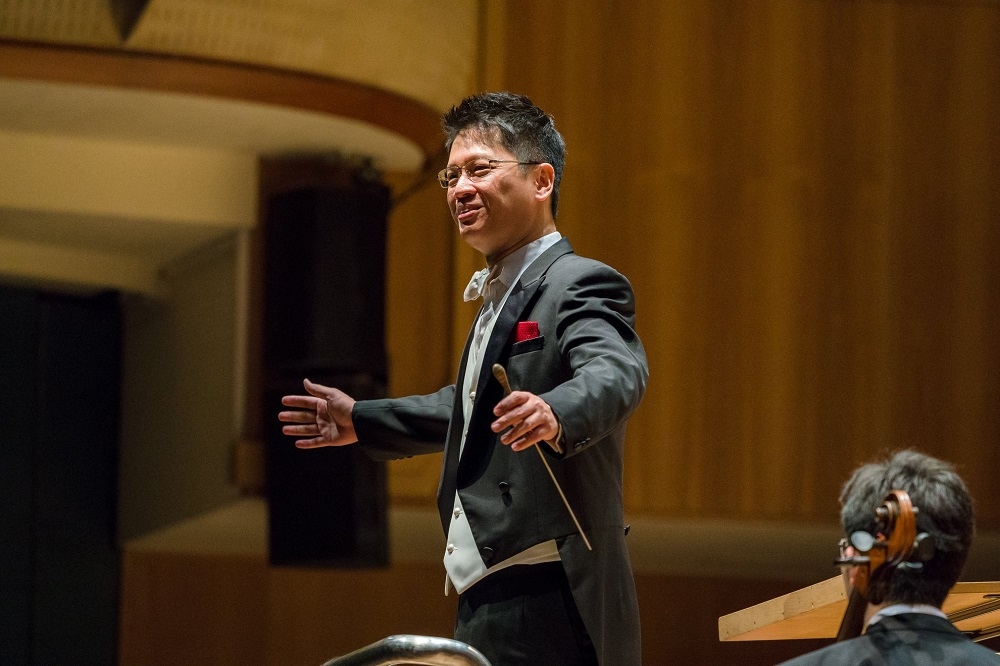SNYO SPOTLIGHT – LEONARD TAN
15 Sep 2023
Natalie Ngai (SNYO Flautist) speaks to Dr Leonard Tan (conductor, music educator, former SNYO tubist and former Principal Conductor of the SNYO from 2014 to 2018) about his vast musical experiences and insights.

Dr Tan on the Esplanade Concert Hall stage with the SNYO in 2018.
Photo: Aloysius Lim
Natalie: We know that you play the tuba, which is not a very common instrument to learn! What led you to start learning the tuba?
Leonard: I started through joining the school band, as would many young people who played in bands. I started playing the cornet for one year, then my band instructor said “Would you like to play the tuba? It’s more expensive” and opened the case, very nice golden, new tuba. So I was… conned (laughs). Like, “wah it looks so nice.” So that got me into playing the tuba.
Natalie: You were also part of the SNYO as a tuba player. What is your fondest memory from your time as an SNYO member?
Leonard: It would definitely be the trip with Mr Lim Yau (SNYO’s Music Director from 1990 to 2002) to Aberdeen, where we played Berlioz’s Symphonie Fantastique in Aberdeen. That was very memorable, I think it was a very well-received concert and the orchestra worked very hard for it, so it was really thrilling to perform overseas. So that was my fondest memory as a member.
Natalie: What was the first thing that drew you towards a career in conducting?
Leonard: I think even during my Junior College days I already started developing that love for conducting. I was student conductor of the Raffles Junior College band and the first time I stood in front of the band I was like, “Wow, what a thrilling experience,” and to be able to see the full score was just a phenomenal experience for me, I really enjoyed it. So I think from that point onwards I’ve always wanted to study conducting and to conduct orchestras.
Natalie: What has your conducting journey been like so far?
Leonard: Oh it’s been thrilling. Sometimes people ask me what’s my favourite piece of music, it will be whatever piece I’m conducting at the moment. So my favourite piece today was, you know, the Tchaikovsky (Serenade and Nutcracker), the Ravel (Valses nobles et sentimentales). I love the fact that music is so much in the moment. And at that point in the moment, you are immersed in music, you are totally absorbed in the music, so every moment conducting has been thrilling. Whether it’s with youth ensembles, professional ensembles, community ensembles, I think the sheer pleasure and delight in working with people to make music together has been extremely exhilarating.
Natalie: How do you usually prepare for your upcoming concerts?
Leonard: Score study is such a crucial thing. A lot of the work of the conductor is seen. You go to an orchestra concert, you see the conductor. There is also the semi-seen, the rehearsals. But there is a lot that is unseen as well. Which is what happens when the conductor closes the door, opens the Tchaikovsky score, and starts looking at music. Because you don’t have the right to be in front of the orchestra unless you know the music well. So it all begins with score preparation. And the whole purpose of score preparation is to arrive at an image of the piece, a vision of the piece. So that it speaks through our bodies, whether it is gestures or through words, we realise that vision together with the musicians. So typically I’ll begin with opening the score, looking at the so-called objective aspects of the music – is it in C minor, B-flat major, the keys, instruments that are playing. But beyond that, after getting the technical aspects, you also start to develop the imagination, the interpretive aspects. So score study is very crucial.
Natalie: Any memorable moments you had on stage as a conductor?
Leonard: It may sound a bit clichéd, but I really enjoy every concert I conduct. Truly. But if I really have to pick one, it would be my Brahms’ Third Symphony with the SNYO in 2017. I’ve always loved Brahms and I think that particular performance of Brahms’ Third was really– we were really in the moment and the orchestra was really with me. It’s not an easy piece, many rhythmic aspects. You kind of go “Where is the downbeat?,” but the orchestra played really, really well. So it was really memorable.

Dr Tan conducting the SNYO at the Victoria Concert Hall in 2017.
Natalie: As an educator, what are some of the important things you take into consideration when teaching your students about music?
Leonard: Well I teach so many facets of music. I teach music education, so I do teacher ed (editor’s note: Dr Leonard Tan is an Associate Professor at the National Institute of Education and is highly sought after as a speaker at education conferences), helping to prepare teachers to go to schools. When I do that, I try to get teachers to get into the “teacher hat”. Not just music but also music education. Thinking as an educator doesn’t have to be ‘either or’: performance goals and education goals, we have to find a way to let them meet. It’s not just about the performance. It is also about nurturing the students. It is about growth. It is about a process.
As for teaching “music” music, to me it’s very important to get students to have an open mind. Western Classical music is a very important tradition, it’s got lots of great music, but at the same time it’s not the only music that’s out there. There is also jazz, pop, Asian music, so [it’s important] to develop that open-mindedness. But if you really push me into a corner and say what matters to me in teaching music or music education, I might say it is down to curiosity and love. To constantly be curious about learning, finding out, and then to have that love for the art form, love for music, love for teaching. Because if you don’t love music, if you don’t love music teaching, then you probably shouldn’t do it. That, to me, and having the passion to do it, is very important.
Natalie: Now let’s move on to some fun questions! What do you like to eat before a concert?
Leonard: I try to eat as little as possible because I don’t want to get into a food coma. So I tend to eat more proteins, less carbohydrates, and just enough to make me not feel so hungry.
Natalie: To you, what musical period/genre is the most interesting?
Leonard: That’s a great question. I find whatever piece I’m conducting the most interesting at that point. If I’m conducting a concert of new music, “Wow! This is a new composition! The composer writes something here that’s interesting, new colour.” Maybe it might be doing Baroque music, “Wow, this is music from 400 years ago!” and opening it with fresh eyes. So I try to see the interesting parts about it, and every time I open a score, that to me is the most interesting piece of music.
Natalie: What are your music recommendations?
Leonard: Be open-minded. Listen to everything. Be exposed to everything and after a while you develop your own tastes and preferences. But it is important not to be snobbish about music – sometimes there are people who say “I only listen to certain genres of music” or “this is more low-class” or that certain kinds of ensembles are higher-class than others – I think that these are social constructs. I think that music is music. Music brings people together. So be open-minded, try out different kinds of music, try out different forms of ensembles and experience the full richness of music. We don’t want a person to say “I like this genre, I don’t like that–” you’re missing out so much!
Natalie: Do you still play the tuba now?
Leonard: Unfortunately not any more. The last time I played was to take a performance exam during my PhD. I needed to demonstrate proficiency of tuba playing and after that, as a poor graduate student, I sold my tuba away and I have never been able to play it since then. But this is something that I hope to do maybe during my retirement – to get back my tuba again and to play. I do miss tuba playing but at the same time I love conducting so much more, if I may. I just enjoy the thrilling experience of looking at scores, getting into the sound world. But I love tuba playing too and I will get back to it. I promise.
Natalie: Any particular aspects of tuba that you like?
Leonard: I think tuba playing at the end of the day remains musical playing. I would like to say this to no matter which instrument you play. With percussion, sometimes people think you just “ping” and I always remind percussionists, “Percussion is a musical instrument. So don’t hit the percussion instrument, play the instrument. And play percussion like it is a melody.” So when you play tuba, sometimes you have “bum bum bum bum”. Well, play it melodically. Give it a shape. Even if you have a long note, give it a shape, give it an intent. Just now we were rehearsing Ravel, sometimes the basses just have a long note. It’s easy to go “I’m just playing a G,” but if you give it musical thought, if you play with understanding, if you play it with artistry, it’s not just a G. It is a work of art. So tuba playing is an artistic endeavour. That is why I love tuba playing. As I do conducting or other instruments that I may be less proficient in like the violin. I played a little bit of the violin, not so good. But no matter what we play, it is an artistic endeavour.
Natalie: What do you do when you are not conducting or teaching music?
Leonard: That’s a great question. Of course, spending time with my family is very important. Besides the work, besides the music-making, I try to spend time with my family as much as possible. Just having a simple meal, enjoying the chats – I think these are important moments for me.
Natalie: Do you practise any other kind of art form?
Leonard: I would love to, but unfortunately music is pretty much the art form so to speak. But in my other hat as a university professor, I do do research. So I do write papers, and I find that very thrilling too. I really enjoy writing papers, and the major thing that I do, the primary thing that I do is philosophy in music education. So why teach music? What are the underlying assumptions of music? What is music education all about? Why should we have orchestras? Why should we teach certain forms of music, why should teachers do what they do? And I’ve enjoyed that philosophical thinking, philosophical writing. And drawing also on mainstream philosophy – Plato, Aristotle, and even Chinese philosophy – Confucius, Zhuangzi, and being exposed to different thinking, different systems of thought. I think that expands my worldview a lot. That’s my hobby and other kind of art form too, in a sense.
Natalie: And finally, any words of wisdom you’d like to share?
Leonard: I think definitely it’s important to do what you love, and love what you do. The SNYO is a great place to make music, it’s a great place to learn, I would highly recommend people to join the SNYO. And to carry this love for the rest of your life, because life has ups and downs, definitely. So when things are up, that’s great, but when things are not so up, what do you do? And I think if you have that love for music, if you have the passion for it, that will keep you going. Never turn sour, never turn bitter no matter what life brings to you. Life is life, life is transient. Make the best of it. Lead life to the fullest. For every moment I conduct, I live it to the fullest and say, “Okay, this is the moment. And let’s enjoy, let’s love it. Let’s be absorbed in it.” So live the moment and love that moment.

Dr Tan with the SNYO after a concert in 2017, Victoria Concert Hall.
Feeling Inspired? Join Us Now
The Singapore National Youth Orchestra organises auditions regularly throughout the year! Audition details and guidelines can be found at www.snyo.org.sg/audition.

